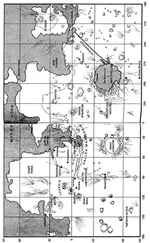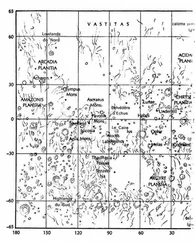And that was the morning. Back into the habitat, helmet and tank off, a quick bite in walker and boots. With all that running around they were famished.
After lunch they went back out in the Mercedes-Benz, and used it to haul a Boeing air miner to an area east of the habitats, where they were going to gather all the factories. The air miners were big metal cylinders, somewhat resembling 737 fuselages except that they had eight massive sets of landing gear, and rocket engines attached vertically to their sides, and two jet engines mounted above the fuselage fore and aft. Five of these miners had been dropped in the area some two years before. In the time since, their jet engines had been sucking in the thin air and ramming it through a sequence of separating mechanisms, to divide it into its component gases. The gases had been compressed and stored in big tanks, and were now available for use. So the Boeings each now held 5,000 liters of water ice, 3,000 liters of liquid oxygen, 3,000 liters of liquid nitrogen, 500 liters of argon, and 400 liters of carbon dioxide.
It was no easy task hauling these giants across the rubble to the big holding tanks near their habitats, but they needed to do it, because after they were drained into the holding tanks they could be turned on again. Just that afternoon another group had gotten one emptied out and turned back on, and the low hum of its jets could be heard everywhere, even in a helmet or a habitat.
Nadia and Samantha’s miner was more stubborn. In the whole afternoon they only managed to haul it a hundred meters, and they had to use the bulldozer attachment to scrape a rough road for it all the way. Just before sunset they returned through the lock into the habitat, their hands cold and aching with fatigue. They stripped down to their dust-caked underwear and went straight to the kitchen, ravenous once more; Vlad estimated they were each burning about 6,000 calories a day. They cooked and gulped down rehydrated pasta, nearly scalding their partially thawed fingers on their trays. Only when they had finished eating did they go to the women’s changing room and start trying to clean themselves up, sponging down with hot water, changing into clean jumpers. “It’s going to be hard to keep our clothes clean, that dust even gets through the wrist locks, and the waist zippers are like open holes.” “Well yeah, those fines are micron-sized! We’re going to have worse trouble from it than dirty clothes, I can tell you that. It’s going to be getting into everything , our lungs, our blood, our brains….”
“That’s life on Mars.” This was already a popular refrain, used whenever they encountered a problem, especially an intractable one.
On some days after dinner there were a couple hours of sunlight left, and Nadia, restless, would sometimes go back outside. Often she spent the time wandering around the crates that had been hauled to base that day, and over time she assembled a personal tool kit, feeling like a kid in a candy store. Years in the Siberian power industry had given her a reverence for good tools, she had suffered brutally from the lack of them. Everything in north Yakut had been built on permafrost, and the platforms sank unevenly in the summer, and were buried in ice in the winter, and parts for construction had come from all over the world, heavy machinery from Switzerland and Sweden, drills from America, reactors from the Ukraine, plus a lot of old scavenged Soviet stuff, some of it good, some indescribably shoddy, but all of it unmatched— some of it even built in inches — so that they had had to improvise constantly, building oil wells out of ice and string, knocking together nuclear reactors that made Chernobyl look like a Swiss watch. And every desperate day’s work accomplished with a collection of tools that would have made a tinker weep.
Now she could wander in the dim ruby light of sunset, her old jazz collection piped from the habitat stereo into her helmet headphones, as she rooted in supply boxes and picked out any tool she wanted. She would carry them back to a small room she had commandeered in one of the storage warehouses, whistling along with King Oliver’s Creole Jazz Band, adding to a collection that included, among other items, an Allen wrench set, some pliers, a power drill, several clamps, some hacksaws, an impact-wrench set, a brace of cold-tolerant bungie cords, assorted files and rasps and planes, a crescent-wrench set, a crimper, five hammers, some hemostats, three hydraulic jacks, a bellows, several sets of screwdrivers, drills and bits, a portable compressed gas cylinder, a box of plastic explosives and shape charges, a tape measure, a giant Swiss Army knife, tin snips, tongs, tweezers, three vises, a wire stripper, X-acto knives, a pick, a bunch of mallets, a nut driver set, hose clamps, a set of end mills, a set of jeweler’s screwdrivers, a magnifying glass, all kinds of tape, a plumber’s bob and ream, a sewing kit, scissors, sieves, a lathe, levels of all sizes, long-nosed pliers, vise-grip pliers, a tap-and-die set, three shovels, a compressor, a generator, a welding-and-cutting set, a wheelbarrow—
and so on. And this was just the mechanical equipment, her carpenter’s tools. In other parts of the warehouse they were stockpiling research and lab equipment, geological tools, and any number of computers and radios and telescopes and videocameras; and the biosphere team had warehouses of equipment to set up the farm, the waste recyclers, the gas-exchange mechanism, in essence their whole infrastructure; and the medical team had more warehouses of supplies for the clinic, and their research labs, and the genetic-engineering facility. “You know what this is,” Nadia said to Sax Russell one evening looking around her warehouse, “It is an entire town , disassembled and lying in pieces.”
“And a very prosperous town at that.”
“Yes, a university town. With first-rate departments in several sciences.”
“But still in pieces.”
“Yes. But I kind of like it that way.”
Sunset was mandatory return-to-habitat time, and in the dusk she would stumble into the lock and inside, and eat another small cold meal sitting on her bed, listening to the talk around her which mostly concerned the day’s work, and the arrangement of the tasks for the next morning. Frank and Maya were supposed to be doing this, but in fact it was happening spontaneously, in a kind of ad hoc barter system. Hiroko was particularly good at it, which was a surprise given how withdrawn she had been on the voyage out; but now that she needed help from outside her team, she spent most of every evening moving from person to person, so single-minded and persuasive that she usually had a sizable crew working on the farm every morning. Nadia couldn’t really see this; they had five years of dehydrated and canned food on hand, fare that suited Nadia fine, she had eaten worse for most of her life and she paid little attention to food anymore, she might as well have been eating hay, or refueling like one of the tractors. But they did need the farm for growing bamboo, which Nadia planned to use as a construction material in the permanent habitat that she hoped to start building soon. It all interlocked; all their tasks linked together, were necessary to each other. So when Hiroko plopped down beside her, she said, “Yeah, yeah, be there at eight. But you can’t build the permanent farm until the base habitat itself is built. So really you ought to be helping me tomorrow, right?”
“No, no,” Hiroko said, laughing. “Day after, okay?”
Hiroko’s main competition for labor came from Sax Russell and his crowd, who were working to start all the factories. Vlad and Ursula and the biomed group were also hungry to get all their labs set up and running. These three teams seemed willing to live in the trailer park indefinitely, as long as their own projects were progressing, but luckily there were a lot of people who were not so obsessed by their work, people like Maya and John and the rest of the cosmonauts, who were interested in moving into larger and better-protected quarters as soon as possible. So Nadia’s project would get help from them.
Читать дальше
Конец ознакомительного отрывка
Купить книгу












